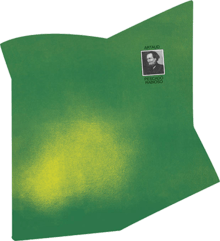Artaud (album)
| Artaud | |||||
|---|---|---|---|---|---|
 Original album cover, notorious for its irregular octagonal shape | |||||
| Studio album by Pescado Rabioso | |||||
| Released | 1973 | ||||
| Genre | Folk rock, psychedelic folk | ||||
| Length | 36:56 | ||||
| Label |
| ||||
| Producer |
| ||||
| Pescado Rabioso chronology | |||||
| |||||
| Luis Alberto Spinetta solo chronology | |||||
|
|||||
| Singles from Artaud | |||||
|
|||||
Artaud (French: [aʁto]) is the third and final album by the Argentine rock band Pescado Rabioso, released in 1973 on Talent and Microfón. Although officially credited to Pescado Rabioso, the group had actually broken up by the time the album was recorded, and it is essentially a solo effort by musician Luis Alberto Spinetta.[1] With this in mind, Artaud is considered Spinetta's fifth studio album as a solo artist.
Named after and dedicated to French poet Antonin Artaud,[2] the album's lyrics and concept are influenced by his work, particularly his essays Heliogabalus: Or, the Crowned Anarchist and Van Gogh, the Man Suicided by Society.[3][4] Another major influence was Spinetta's pairing with Patricia Salazar, with whom he would form a stable partnership for nearly 25 years and constitute a family with four children.[5][6]
Musically, Artaud meant a rupture in the musical style called "national rock" in Argentina and rock en español in general.[6] Its sound is primarily acoustic and intimate, moving away from the hard rock of Pescado Rabioso's earlier albums. Richie Unterberger wrote: "If it's something of a progressive/psychedelic record, it has more to do with the juxtaposition of late-'60s and early-'70s styles on display than it has to do with the music itself."[1] Essayist Sergio Pujol has referred to it as "perhaps the pinnacle of Argentine rocker avant-garde."[7]
Artaud is now considered by many to be one of the greatest albums, if not the greatest, in the history of Argentine rock, and Spinetta's magnum opus.[8][9] Ramón Garibaldo Valdéz and Mario Bahena Urióstegui argue that its release made Argentine rock the largest dissident musical movement on the continent.[10] In 2007, the Argentine edition of Rolling Stone magazine ranked it number one in its list of the "100 Best Albums of Argentine Rock".[11] In the album's entry, Pablo Schanton describes it as "a liberating cultural event" and "an aura of something unrepeatable [...] The aura of doing and being rock in a more direct, more artistic, more handcrafted and less massive manner."[12] Artaud remains an important source of influence in Spanish-language music, and virtually every track on the album is a classic in Spinetta's repertoire.
Track listing
All songs written and composed by Luis Alberto Spinetta.
| Side one | ||
|---|---|---|
| No. | Title | Length |
| 1. | "Todas la hojas son del viento" | 2:12 |
| 2. | "Cementerio Club" | 4:55 |
| 3. | "Por" | 1:45 |
| 4. | "Superchería" | 4:21 |
| 5. | "La sed verdadera" | 3:32 |
| Side two | ||
|---|---|---|
| No. | Title | Length |
| 6. | "Cantata de puentes amarillos" | 9:12 |
| 7. | "Bajan" | 3:26 |
| 8. | "A Starosta, el idiota" | 3:15 |
| 9. | "Las habladurías del mundo" | 4:03 |
Total length: |
36:56 | |
Personnel
Credits adapted from the liner notes of Artaud.[2]
- Luis Alberto Spinetta - composer, producer, vocals, acoustic guitar, electric guitar, maracas, cymbal, cover design
- Norberto Orliac - engineer, effects in "A Starosta, el idiota" (uncredited)
- Jorge Álvarez - producer (uncredited)
- Carlos Gustavo Spinetta - drums in "Cementerio Club" and "Bajan"
- Emilio Del Guercio - bass guitar in "Cementerio Club", "Superchería", "Bajan" and "Las habladurías del mundo"; backing vocals in "Superchería" and "Las habladurías del mundo"
- Rodolfo García - drums, cowbell and backing vocals in "Superchería" and "Las habladurías del mundo"
- Juan Carlos Robles Robertone - effects in "La sed verdadera" (uncredited)
- Pedro Aznar - effects in "A Starosta, el idiota" (uncredited)
- Juan Orestes Gatti - design (uncredited)
Notes
- 1 2 Unterberger, Richie. "Artaud - Pescado Rabioso". AllMusic. All Media Network. Retrieved January 30, 2016.
- 1 2 Artaud (liner notes). Pescado Rabioso. Talent/Microfón. 1973.
- ↑ Berti, 1988. p.15
- ↑ Berti, 1988. p.44
- ↑ "Público y privado: su vida afectiva". Clarín (in Spanish). Clarín Group. February 9, 2012. Retrieved January 30, 2016.
- 1 2 Artaud (YouTube). Buenos Aires, Argentina: Elepé. TV Pública. June 29, 2009. Retrieved January 30, 2016.
- ↑ Pujol, Sergio (June 2015). "Escúchame, alúmbrame. Apuntes sobre el canon de "la música joven" argentina entre 1966 y 1973". Apuntes de investigación del CECYP (in Spanish). Buenos Aires, Argentina: Centro de Estudios en Cultura y Política (CECYP). ISSN 1851-9814. Retrieved January 30, 2016.
- ↑ "Artaud, el mejor disco de la historia del rock argentino". La Nación (in Spanish). La Nación. February 8, 2012. Retrieved January 30, 2016.
- ↑ Mihanovich, Sandra (December 1, 2014). Soy lo que soy: Mujeres y hombres que rompieron el molde (in Spanish). Editorial Sudamericana. p. 118. ASIN B00QXSNMEE. Retrieved January 30, 2016.
- ↑ Garibaldo Valdéz, Ramón; Urióstegu, Mario Bahena (June 2015). "Noise and nation: how iberoamerican rock redefined the sense of community in Latin America". Diálogos: Revista Electrónica de Historia (in Spanish). San Pedro, Costa Rica: University of Costa Rica. ISSN 1409-469X. Retrieved January 30, 2016.
- ↑ "Los 100 mejores discos del rock nacional". Rolling Stone Argentina (in Spanish) (Publirevistas S. A). April 2007. List available online here
- ↑ Schanton, Pablo (May 29, 2007). "Artaud - Pescado Rabioso". Rolling Stone Argentina. La Nación. Retrieved January 30, 2016.
References
- Berti, Eduardo (1988). Spinetta: crónica e iluminaciones. Editora AC. ISBN 9789504940555.
External links
- Artaud at Discogs (list of releases)
- Artaud statistics, tagging and previews at Last.fm
- Artaud at Rate Your Music